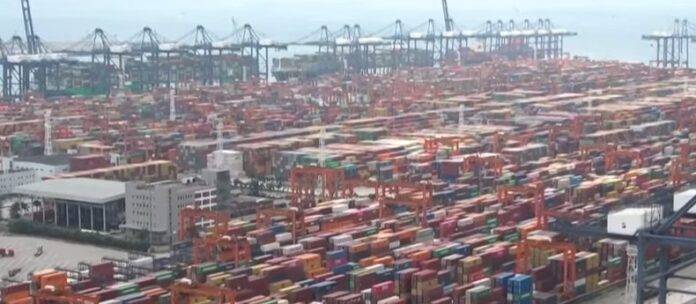Newsman: The U.S. and China said Monday that they have agreed to slash reciprocal tariffs as the world’s two biggest economies seek to end a trade war that has fueled fears of inflation and recession and disrupted financial markets around the globe. The deal comes days after the Trump administration announced a deal with the United Kingdom.
US-China agree on 90-day pause to cut reciprocal tariffsThe United States and China issued a joint statement on Monday announcing an agreement to cut reciprocal tariffs for 90 days.
The U.S. and China issued a joint statement on Monday announcing an agreement to cut reciprocal tariffs for 90 days, with both sides “recognizing the importance of a sustainable, long-term, and mutually beneficial economic and trade relationship.”
U.S. and Chinese representatives convened for talks in Geneva, Switzerland, this weekend in a bid to establish the basis for negotiations in a broader potential trade deal. President Donald Trump’s “Liberation Day” tariff measures announced in April touched off a spiralling trade war between the two economic giants, roiling markets and prompting fears of a recession in the U.S.
“We have reached an agreement on a 90-day pause and substantially move down the tariff levels,” Treasury Secretary Scott Bessent said at a Monday press conference in Geneva. “Both sides, on the reciprocal tariffs, will move their tariffs down 115%,” Bessent said.
U.S Trade Representative Jamieson Greer added that the U.S and China will maintain 10% reciprocal tariffs as part of the agreement.
“Today, with this agreement, we come to agreement that though that our reciprocal tariff rate will go down to 10% on the United States side,” Greer said. “The Chinese on their side also go down 115% to 10% and they remove the countermeasures that they have in place.”
U.S Trade Representative Greer confirmed that during the pause, the effective tariff on Chinese goods entering the U.S. will be 30%. He also said that China’s effective tariffs will be at 10% for the duration of the pause. The changes will come into force by Wednesday, the joint U.S.-China statement said.
“What matters for the agreement today is that we each agreed to come down on the reciprocal tariff and related retaliation to 10%,” Greer said.
In a statement carried by China’s official state news agency Xinhua, Beijing said that the two sides “will establish a mechanism to continue discussions about economic and trade relations” once the measures set out in Monday’s agreement were in place.
“These discussions may be conducted alternately in China and the United States, or a third country upon agreement of the parties,” the statement continued. “As required, the two sides may conduct working-level consultations on relevant economic and trade issues.”
In a media briefing on Sunday, Chinese Vice Premier He Lifeng said trade talks with the U.S. “achieved substantial progress and reached important consensus.”
Earlier Sunday, the White House said that it reached an agreement without providing any details.
U.S Trade Representative Greer called it a “deal,” but Bessent said only that “substantial progress” had been made
U.S. markets rocketed higher after Treasury Secretary Scott Bessent told reporters the two sides had agreed that tariffs would come down by over 100 percentage points. The U.S. will cut extra tariffs it imposed on Chinese imports in April to 30% from 145%, while Chinese duties on U.S. imports will fall to 10% from 125%.
The new measures are effective for 90 days. President Donald Trump, in a briefing early Monday, said key elements of the deal included pledges from China to open markets to American businesses and to eliminate “non-monetary” trade barriers. He said China also agreed to cut off the flow of fentanyl to the U.S.
The deal does not include tariffs on cars, steel, aluminum and pharmaceuticals, Trump said. He said he planned to speak with Chinese leader Xi Jinping “maybe at the end of the week.”
“We are not looking to hurt China,” Trump said. “They were very happy to do something with us. The relationship is very very good.”
China’s commerce ministry said the agreement will “lay the foundation to bridge differences and deepen co-operation.”
Treasury Secretary Scott Bessent and Trade Representative Jamieson Greer began meeting with their Chinese counterparts in Geneva on May 10 − just days after the Trump administration announced a deal with the United Kingdom.

